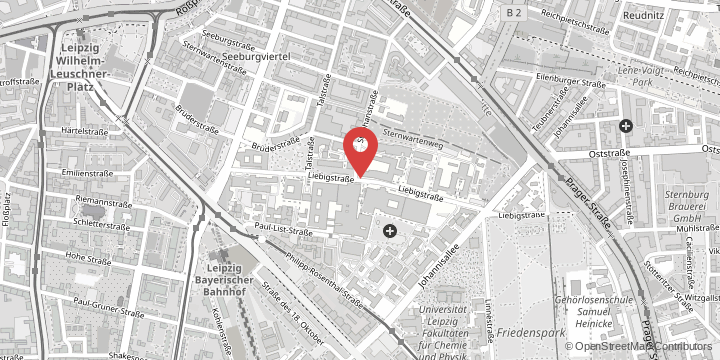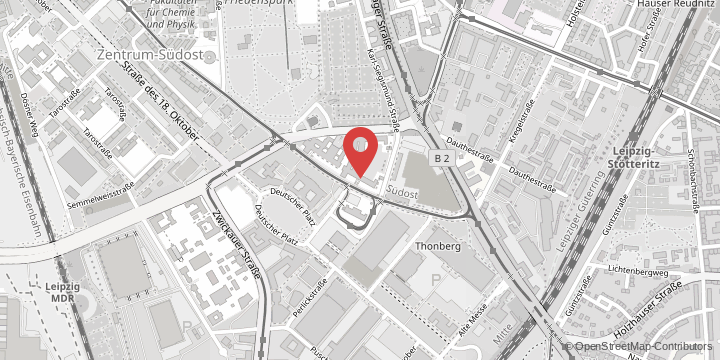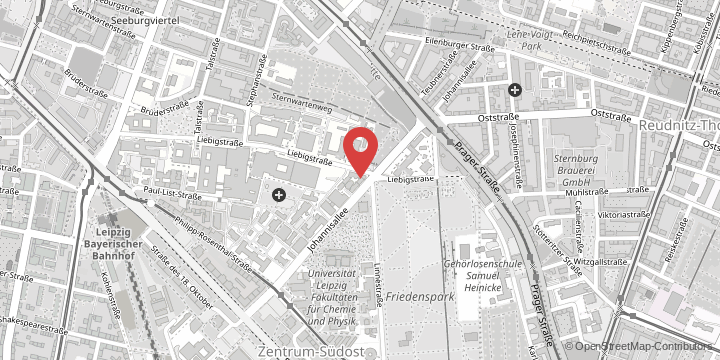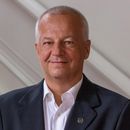Your independent career as a researcher will be heavily dependent on the acquisition of external funding. Different organisations offer funding for your own position or scholarships for your early career research group or other employees, as well as grants for material and travel expenses. Our research service advises you on potential funding sources and their respective regulations, on open calls for proposals and internal support possibilities. We can also help you to write your proposal.
Initial Funding: Leipzig Flexible Fund
The Leipzig Flexible Fund provides postdoctoral researchers (including junior professors on fixed-term contracts) with funding for preparatory activities for their own external funding application.
The goal of this funding is the submission of an external funding application – for example to the German Research Foundation (DFG), other foundations, federal and state ministries, or the EU.
Grants are available for preparatory activities that are necessary to prepare the external funding application:
- Travel costs (e.g. conferences, workshops, research, meetings with project partners)
- Publications (which are an indispensable prerequisite for submitting the research proposal to an external funding body, if not covered by the Open Access Publishing Fund)
- Consumables, study costs
- Student or graduate assistants supporting the application
- Coaching (e.g. interview training)
Detailed information on how to apply for funding from the Flexible Fund can be found in the guidelines and the application form. Please direct any questions to Dr Sindy Schug and Dr Barbara Weiner.
Early career researchers at the Faculty of Medicine are excluded. The Faculty of Medicine has dedicated funding programmes for them.
Funding
Based on your current career phase, we will advise you on specific external funding programmes run by various national and international funding bodies. The Research Funding pages contain information on the application process and our relevant contact persons from initial idea to project completion; on the funding programmes run by the DFG, federal and state ministries, and foundations; on DAAD research programmes; on science prizes; and on the EU and other international funding bodies.
We provide you with personal advice on the application process, for example on the structure of the application, on quality assurance and handling research data as well as project costing.
The following is a selection of ways to fund your own position as a postdoctoral researcher:
Under the DFG’s standard Individual Research Grants programme, you can use the Temporary Positions for Principal Investigators module to apply for funding for your postdoctoral position, usually for a project period of up to three years.
To submit a proposal, you must submit a legally binding “Employer’s Declaration” (DFG form 41.027) to the DFG, i.e. one signed by the Head of Administration and Finance. We will obtain this signature on your behalf.
Advice and support are available from Dr Sindy Schug and Dr Barbara Weiner.
The DFG’s Walter Benjamin Programme is aimed at postdoctoral researchers in the early stages of their career following their doctorate. The Walter Benjamin Fellowship module is one way to secure funding for a two-year postdoctoral stay abroad. Alternatively, you can apply for the Walter Benjamin Position module for a position for up to two years at a German research institution.
To submit a proposal in the Walter Benjamin Position module, you must submit a legally binding “Employer’s Declaration” (DFG form 41.027) to the DFG, i.e. one signed by the Head of Administration and Finance. We will obtain this signature on your behalf.
Advice and support are available from Dr Sindy Schug and Dr Barbara Weiner.
Research fellowships are of particular interest to younger postdocs (early career researchers) of interest. In addition to small-scale research projects, such as grants for personal maintenance or printing costs, there are many fellowship opportunities, especially for research stays abroad.
Below is a list of scholarship donors for national projects:
- The Fritz Thyssen Foundation supports young postdoctoral researchers with a research fellowship spanning a maximum of two years in the fields of history, language and culture; state, economy and society; medicine and natural sciences; and in the interdisciplinary field “Image-Sound-Language”. In addition, it awards grants for travel and printing costs and supports small academic conferences.
- The Gerda Henkel Foundation awards research fellowships for between one and 24 months in the historical humanities.
- The Liebig Fellowship of the Fonds der Chemischen Industrie supports postdoctoral chemists up to three years after their doctorate with a scholarship for their own maintenance needs, a doctoral position and material resources. The aim is to establish a junior research group.
- The Peter und Traudl Engelhorn Stiftung awards two-year postdoctoral fellowships in the field of life sciences.
There are a number of fellowship opportunities for short and long-term stays abroad. As a rule, these stays are of interest to young postdoctoral researchers interested in changing their academic environment, gaining international experience, and building up an international network in readiness for a career in academia. Here you will find a selection of funding opportunities for your stay abroad as a postdoctoral researcher:
- DAAD scholarship database: funding opportunities from the DAAD and other funding organisations; research by subject area and destination country
- DAAD research grants for postdoctoral of all subjects for research stays abroad lasting three to six months
- DAAD Postdoctoral Researchers International Mobility Experience (PRIME) for postdocs in all subjects for a twelve-month research stay abroad plus a six-month integration phase in Germany; more information is available here
- DFG Research Fellowships for postdoctoral researchers of all subjects for research stays of up to two years of research abroad and, in some cases, a six-month reintegration phase in Germany
- DFG Walter Benjamin Programme for postdoctoral researchers of all subjects for research stays of up to two years and, in some cases, return grants
- Alexander von Humboldt Foundation Feodor Lynen Rsearch Fellowships for postdoctoral researchers of all subjects for research stays abroad of between six and 24 months and, in some cases, a reintegration phase in Germany if necessary; up to four years after completing a doctorate
- Fritz Thyssen Foundation: travel subsidies for postdoctoral researchers of all subjects for research stays at in Germany and abroad
- Marie Sklodowska-Curie Individual Fellowships for postdoctoral researchers of all disciplines in the EU’s Horizon 2020 programme, for research stays in other European countries (12–24 months) or in non-European countries (24–36 months); more information is available here
- Marie Skłodowska-Curie COFUND (co-funding of regional, national and international programmes): funded by the COFUND programme, various European host institutions award fellowships of between six and 24 months; more information is available here
- European Research Council: ERC Starting Grants for postdoctoral researchers of all disciplines, from two to seven years after completing their doctorate, to help them establish their first independent research team (all disciplines), to carry out a research project in an EU country or a country associated with the EU; funding for a maximum of five years; more information is available here
- European Research Council: ERC Consolidator Grants for experienced researchers of all disciplines, from seven to twelve years after completing their doctorate (all disciplines), to carry out a research project in an EU country or a country associated with the EU; funding for a maximum of five years; more information is available here
- Japan Society for the Promotion of Science: JSPS Research Fellowships for postdoctoral researchers for short stays (1–12 months) and research stays (12–24 months) in Japan
- Leopoldina Postdoc Scholarships for postdoctoral researchers up to seven years after completing their doctorate (scientific and medical disciplines) who can already demonstrate an independent research profile; for between one and three years abroad
- European Molecular Biology Organisation: EMBO Postdoctoral Fellowships for postdoctoral researchers in the field of molecular biology for up to 24 months
- Federation of European Biochemical Societies: FEBS Fellowships for postdoctoral researchers in the field of biochemistry
- Human Frontier Science Program: HFSP short and long-term fellowships for postdoctoral researchers in the fields of biology and life sciences
- Fellowships of the Gerda Henkel Foundation for postdoctoral researchers in the historical humanities
Further scholarship programmes and funding opportunities can be found in the following databases:
- Stipendiumplus
- Electronic Research Funding Information System (ELFI)
- DAAD scholarship database especially for international mobility
- KISSWIN offers information and advice on academic careers as well as job advertisements and a list of foundations and funding bodies.
- The website www.scholarshipportal.com searches funding opportunities and current calls for proposals within Europe.
- EURAXESS offers international mobility, jobs and funding opportunities.
Junior Research Groups
Programmes for junior research groups offer young academics a high level of financial support in order to establish and lead their own research group. Under these programmes, you assume a leadership role that prepares you for a professorship. Various national funding initiatives offer junior research group programmes. With its ERC Starting Grants, the EU supports excellent early career researchers.
The DFG’s Emmy Noether Programme funds outstanding postdoctoral researchers to help them establish a junior research group at a German research institution. Applications are open to postdoctoral researchers as well as junior professors employed on fixed-term contracts who are in an early stage of their academic career, generally up to four years after completing their doctorate (extensions are possible in the case of parental leave, etc.). During the funding period, the group leaders should satisfy the requirements for a professorship, for example by completing the habilitation process. Funding runs for six years. Applications can be submitted at any time.
If you are interested, please contact Dr Sindy Schug and Dr Barbara Weiner.
The DFG’s Heisenberg Programme is aimed at highly experienced, outstanding postdoctoral researchers who have completed their habilitation or achieved an equivalent qualification or hold a temporary junior professorship. This means that you should already meet all the requirements to be appointed to a professorship. The programme helps you to prepare for a future senior academic role as a permanent professor.
Heisenberg Programme funding runs for five years; applications can be submitted at any time. Once you have been accepted for the Heisenberg Programme, you can choose between four options and, if necessary, combine them over the course of the five-year fellowship: Heisenberg fellowships, Heisenberg positions, Heisenberg temporary substitute positions for clinicians, and Heisenberg professorships. You can, for example, combine your application with an application for an Individual Research Grant in order to work on further research topics together with your staff.
Your contact persons for questions concerning the application process are Dr Sindy Schug and Dr Barbara Weiner.
With its ERC Starting Grants, the European Commission supports promising early career researchers at the beginning of their academic career, two to seven years after completing their doctorate. This programme is aimed at excellent researchers who want to start an independent academic career and establish their own research group at the most suitable institution. The European Research Council (ERC) targets high-risk frontier research and pursues the sole criterion of excellence – in terms of both the project and the researcher. Projects can be anchored in all subject areas. There is an annual cut-off date for applications.
With its ERC Consolidator Grants, the European Commission supports promising researchers whose own working group is in the process of consolidating its independence. This programme is aimed at excellent researchers seven to twelve years after completing their doctorate who have already demonstrated their academic independence with an extensive list of publications or by heading a junior research group. Projects can be anchored in all subject areas. There is an annual cut-off date for applications.
Contact
As an early career researcher from abroad, you can apply for the Alexander von Humboldt Foundation’s renowned Sofja Kovalevskaja Award to establish a research group over a period of five years. You should have completed your outstanding doctorate no more than six years ago. The foundation awards the prizes, which are endowed with up to 1.65 million euros, once a year. As head of a junior research group, the award gives you the opportunity to conduct your research at a German research institution. Applications must include a statement from your academic host as well as confirmation from the host institution and a certificate from the administration with a legally binding signature of the Head of Administration and Finance.
If you are interested, please contact Dr Barbara Weiner before applying.
The German Federal Ministry of Education and Research announces the funding of junior research groups in calls for proposals for specific fields.
For more information, please go here or contact Dr Sindy Schug.
Related Links
- Funding from Leipzig University Library for open access publications
- Travel allowance from the Graduate Academy Leipzig for active conference participation
- Travel allowance for research stays under the Leibniz TRAVEL programme
- Support for inviting international visiting scholars under the Leibniz INVITATIONS programme.
- Short-term scholarships for international postdoctoral researchers at Leipzig University under the STIBET programme
- Research tools and databases
- Pre-Doc Award for excellent research, supervision and promotion of early career researchers
































































